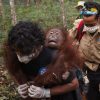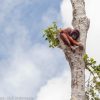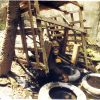Rescues
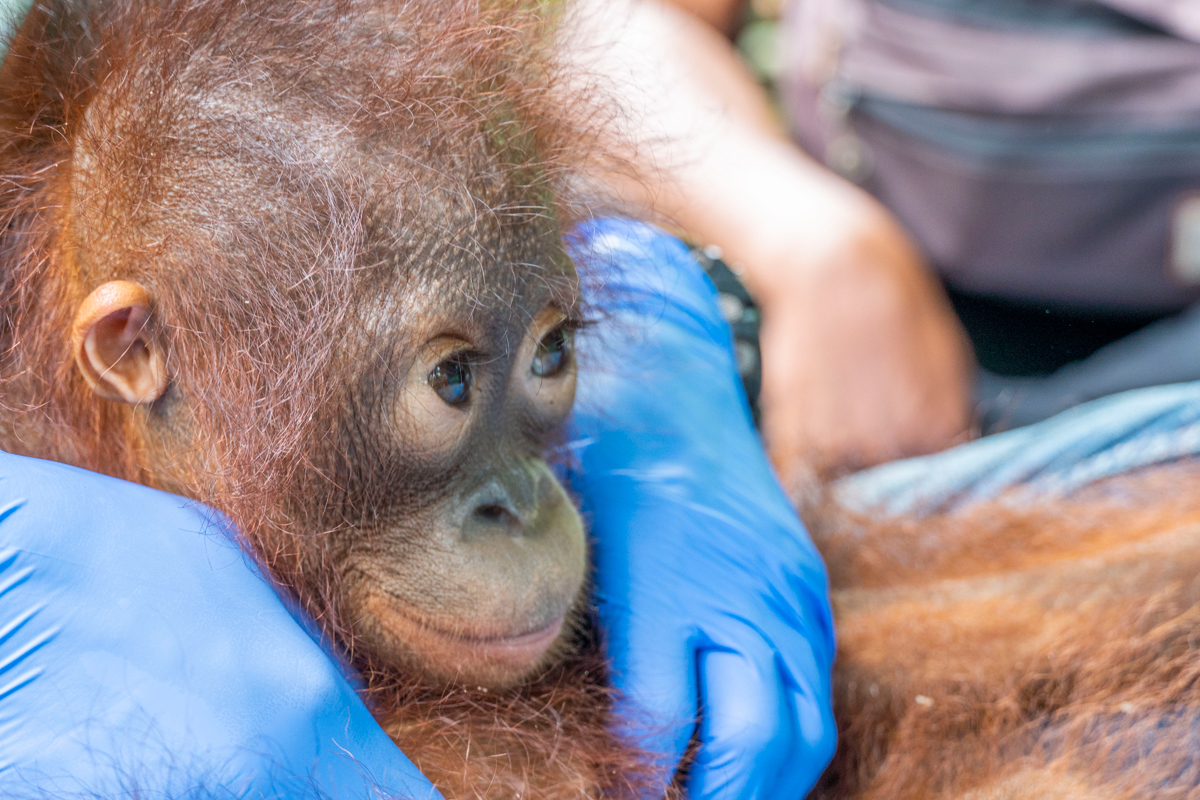
Click on the thumbnail below to see the image full size.
RESCUE – The First R of "Red Ape Relief"
There are several reasons why orangutan may need the assistance of humans to rescue them from a dangerous or unnatural situation. These circumstances include when an orangutan is too close to human activity, trapped, injured, or is being kept as a pet. When our partners in Indonesia are alerted to orangutans who need help, their rescue teams are immediately deployed. The teams may travel for several hours or even several days to reach the orangutan in need of help. Orangutan Outreach provides critically-needed funding so that every orangutan in need receives the help they deserve.
The Cost of Forest Loss
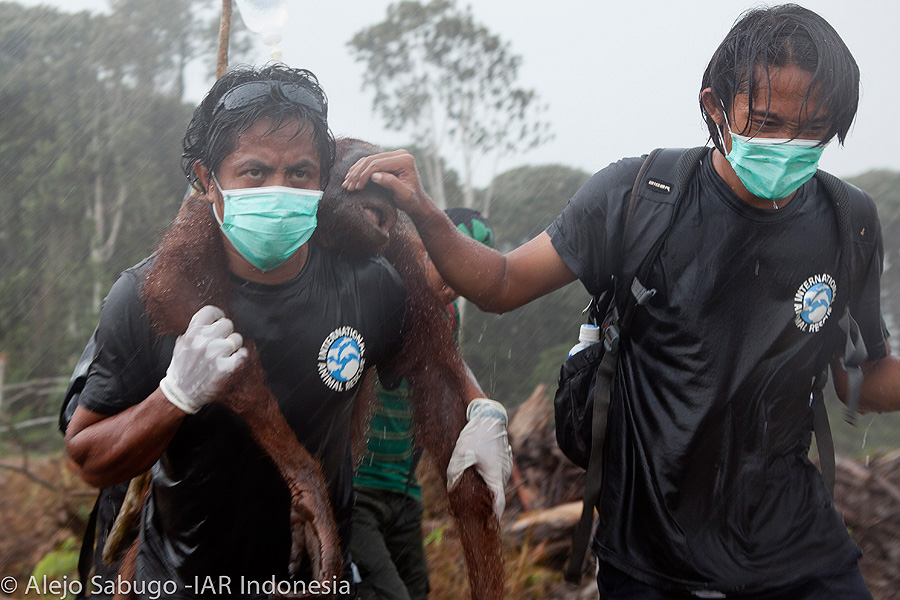 When the rainforest is cut down or burned, orangutans and other animals living there are forced to flee to new areas. Many times orangutans have no other option but to enter into villages in order to find food. This causes human-orangutan conflict as the villagers do not want an orangutan hanging around. Villagers fear for the safety of their family, and for the safety of their crops, which are their livelihood. The best case scenario is that a villager will contact professionals to safely remove the orangutan. Our partners working on the island of Borneo are in favor of relocating wild orangutans to safer forest areas whenever possible. This operation is called 'translocation'. When an orangutan has come too close to a village, a relocation operation is completed.
When the rainforest is cut down or burned, orangutans and other animals living there are forced to flee to new areas. Many times orangutans have no other option but to enter into villages in order to find food. This causes human-orangutan conflict as the villagers do not want an orangutan hanging around. Villagers fear for the safety of their family, and for the safety of their crops, which are their livelihood. The best case scenario is that a villager will contact professionals to safely remove the orangutan. Our partners working on the island of Borneo are in favor of relocating wild orangutans to safer forest areas whenever possible. This operation is called 'translocation'. When an orangutan has come too close to a village, a relocation operation is completed.
In addition to being pushed toward humans as their home is destroyed, orangutans also have to deal with forest fragmentation. This occurs when parts of the forest are destroyed and what remains is left in disconnected fragments. Orangutans are arboreal and want to stay in the trees. But when the forest is fragmented, orangutans have no choice but to come out of the trees and cross the land to get to the next patch of forest where there may be food or mates.
Too often we are shown videos of orangutans crossing major roads, and again coming into contact with humans. The orangutans are also often forced to cross through oil palm plantations, which have taken over their habitat. At times, the orangutans stay in the plantations as it is their only option for food. Orangutans need to be rescued any time they are in a oil palm plantation, as the owners will not tolerate this intrusion. The orangutans are in danger of being shot as a “pest”, or being captured to be kept as a camp mascot. An orangutan rescued from a plantation may be healthy enough to be translocated. If the orangutan is hurt or sick, they will be taken to an orangutan rehabilitation center.
Another perilous situation orangutans face from forest loss is becoming trapped and isolated in burnt landscapes, where they face starvation. When orangutans are rescued from these situations by our Indonesian partners, they are often traumatized, malnourished, and in need of medical attention. These orangutans are also taken to rehabilitation centers.
Orangutans as Pets
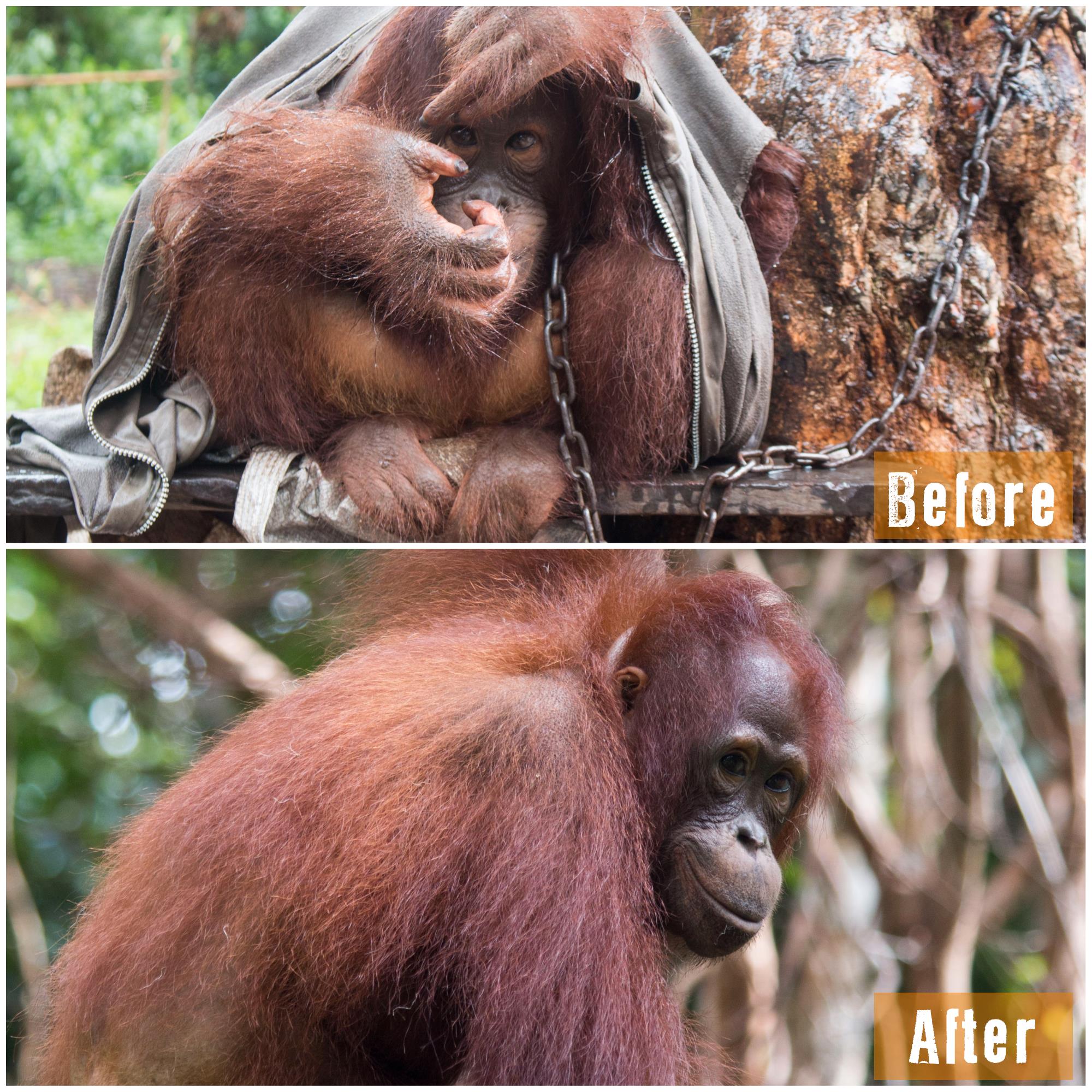
The orangutan is an endangered species and therefore worth a lot of money on the black market. The little ones, with such human-like behaviors and requiring a great need for comfort, often become popular entertainment. In Asia there is a big market for orangutan babies. In both Indonesia and Malaysia there is great prestige to have a captured wild animal in your home. It is particularly shocking that many of the people who keep orangutans as pets are the very people who should be enforcing the law. Customs around the world are in constant pursuit of people smuggling baby orangutans, but few criminals are caught. Orangutan Outreach partners with an organization called Conservation Litigation to address these issues.
It is illegal to keep orangutans as pets in Indonesia. Yet it happens far too often. While some babies are kept inside homes and treated as a member of the family, it is also common that the orangutans are held captive outdoors in small wooden cages or chained to poles where they are exposed to the wind, rain or too much sun. We MUST rescue orangutans from this horrific life.
Most captured orangutans can be found within Indonesia. They turn up not only in Borneo and Sumatra but also quite often on the islands of Java and Bali. To be clear, it is a punishable offense to keep an orangutan at home, but it is rare that the consequences are anything more than a warning. A confiscation rescue happens in collaboration with an established rehabilitation center and representatives of a government agency. A veterinarian and a number of experienced staff from the center are brought to the confiscation in order to ensure the best possible treatment of the orangutan throughout the process. Most of these rescued orangutans are infants, although we have seen orangutans of all ages being kept as pets. Every orangutan rescued from life as a pet is brought to an orangutan rehabilitation center and receives all the love and care they need. If they are young enough, they begin the process of rehabilitation.
Most of the rescues supported by Orangutan Outreach are completed by our partners, Borneo Orangutan Survival Foundation, International Animal Rescue Indonesia and the Sumatran Orangutan Conservation Programme. We thank you for your donations to support these vital activities.
After being rescued, the next step for orangutans and the next “R” of orangutan conservation, is Rehabilitation.
The 5 Rs of Red Ape Relief
Rescues (back to the top)
Rehabilitation
Releases
Retirement
Reforestation


